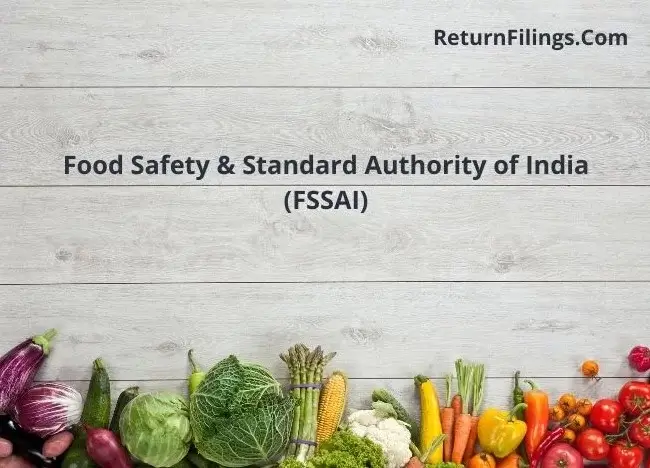FSSAI Annual Return Filing in India: Types, Deadlines & Penalties
1. Introduction
The Food Safety and Standards Authority of India (FSSAI) is the governing body responsible for ensuring the safety and standards of food products in India. To maintain compliance, Food Business Operators (FBOs) must adhere to various regulatory requirements, including the timely filing of FSSAI Annual Returns. Failure to comply with these regulations may lead to penalties.
This guide provides a detailed overview of FSSAI annual returns, their filing requirements, penalties, and exemptions, ensuring that food businesses remain compliant.
2. Types of FSSAI Annual Returns
FSSAI has mandated two types of Annual Returns for Food Business Operators (FBOs):
a. Form D1 – Applicable to all manufacturing and importing units (excluding milk and milk product units).
b. Form D2 – Applicable only to milk and milk product processing units and is filed on a half-yearly basis.
3. Who Needs to File FSSAI Annual Returns?
Any FBO engaged in food manufacturing, processing, or import/export of food products is required to file annual returns. This includes:
• Food manufacturers
• Food importers/exporters
• Food processors
• Warehousing and storage units
3.1 Exemptions from Filing FSSAI Annual Returns
Certain businesses are exempt from filing FSSAI annual returns, including:
• Wholesalers, retailers, and marketers of food products
• Fast food joints, restaurants, grocery stores, and canteens
4. Filing of FSSAI Annual Returns
4.1 Form D1 (Annual Return)
Applicability:
• Required for all food manufacturing and importing units (except milk and milk products)
Details Required:
a. Name of the food product manufactured, handled, sold, imported, or exported.
b. Size and type of packaging (e.g., bottle, can, bulk, PP, etc.).
c. Quantity in metric tons.
d. Selling price per kilogram or per unit.
e. Total value of food products sold/imported/exported.
f. List of countries or ports to which products are exported.
g. Rate per unit/Kg (C.I.F./F.O.B.).
Due Date:
• Must be filed by May 31st for the financial year ending March 31st.
4.2 Form D2 (Half-Yearly Return for Milk and Milk Products)
Applicability:
• Required for milk processing and dairy businesses.
Details Required:
a. Type and quantity of milk/milk products handled.
b. Procurement details (source of milk supply).
c. Processing and distribution data.
Due Dates:
• For April to September: Must be filed by October 31st.
• For October to March: Must be filed by April 30th.
5. Penalty for Non-Compliance
Failing to file FSSAI annual returns within the stipulated time results in financial penalties.
| Type of Default | Penalty |
|---|---|
| Delay in filing annual return | INR 100 per day from the due date until filed |
| Failure to file return | Subject to further action under FSSAI Act, 2006 |
6. How to File FSSAI Annual Returns?
FBOs can file their FSSAI Annual Returns using the following methods:
Online Filing via FSSAI Portal:
o Log in to the FSSAI Food Licensing and Registration System (FLRS).
o Navigate to the Annual Return section.
o Fill in Form D1 or D2, as applicable.
o Submit the form before the due date.
Offline Filing (Physical Submission):
o Download the relevant Form D1 or D2 from the FSSAI website.
o Fill in the required details manually.
o Send the completed form via registered post or email to the FSSAI Licensing Authority.
7. Importance of Timely FSSAI Compliance
Ensuring timely filing of FSSAI annual returns helps businesses:
• Avoid financial penalties and legal consequences.
• Maintain a good compliance record.
• Enhance credibility and trustworthiness in the market.
8. How ReturnFilings.Com Helps
At ReturnFilings.Com, we specialize in FSSAI compliance management, offering:
• Timely reminders for due dates and filings.
• Expert consultation on FSSAI regulatory requirements.
• End-to-end filing assistance to ensure accurate submissions.
By staying informed and adhering to FSSAI Annual Return compliance, food businesses can operate smoothly and efficiently while avoiding unnecessary penalties.
By adhering to the above compliance requirements, avoid penalties, and maintain good legal standing. For professional assistance, reach out to us on email: info@returnfilings.com or on whatsapp: https://wa.me/919910123091 to ensure all statutory obligations are met on time.
frequently asked questions (faq's) related to FSSAI Annual Return and Compliances
Q What is FSSAI?+
A The Food Safety and Standards Authority of India (FSSAI) is an autonomous body under the Ministry of Health and Family Welfare, Government of India. It is responsible for setting standards for food safety and regulating the manufacturing, storage, distribution, and sale of food to ensure safe and wholesome food for human consumption.
Q Why is FSSAI registration/licensing important?+
A FSSAI registration or licensing is mandatory for all Food Business Operators (FBOs) involved in any stage of food business operations. It ensures compliance with food safety standards and builds consumer trust. Operating without a valid FSSAI license is illegal and can attract penalties.
Q Who needs FSSAI registration/license?+
A Any person or entity involved in the food business, including manufacturers, processors, packers, distributors, retailers, caterers, and food service operators, needs FSSAI registration or a license depending on their scale of operation. Even small food stalls and home-based food businesses may require registration.
Q What is the difference between FSSAI registration and license?+
A FSSAI Registration is required for small food businesses with an annual turnover below ₹12 lakh, whereas an FSSAI License is required for larger businesses exceeding this turnover. Licensing involves stricter requirements, including inspections and FSMS implementation.
Q What are the different types of FSSAI licenses?+
A There are three types of FSSAI licenses:
• Central License for large-scale businesses operating in multiple states or dealing with imports/exports.
• State License for businesses operating within a specific state.
• Basic Registration for small businesses and petty food vendors.
Q Do all FBOs need to file an annual return?+
A No, only FBOs holding an FSSAI License (Central or State) are required to file an annual return. Small businesses with basic registration are generally exempt.
Q What is the FSSAI annual return?+
A The FSSAI annual return (Form FSSAI-9) is a document submitted by licensed FBOs detailing their food business activities during the financial year. It helps FSSAI track food production, sales, and compliance.
Q What information is included in the FSSAI annual return?+
A The return includes details like FBO’s license number, type of food products handled, quantity manufactured/sold, supplier and distributor details, and any product recalls.
Q What is the due date for filing the FSSAI annual return?+
A The due date for filing the annual return is May 31st for the previous financial year ending on March 31st.
Q What happens if an FBO fails to file the annual return?+
A Failure to file the annual return can result in penalties, including fines. Continued non-compliance can lead to license suspension or cancellation.
Q What are the key FSSAI compliances besides the annual return?+
A Other key compliances include maintaining hygiene and sanitation standards, implementing a Food Safety Management System (FSMS), complying with labeling requirements, adhering to advertising regulations, and conducting regular food testing.
Q What are the FSSAI labeling requirements?+
A Food products must display the name and address of the manufacturer, ingredient list, nutritional information, expiry date, veg/non-veg symbol, allergen warnings, and the FSSAI logo with the license number.
Q What is FSMS and who needs to implement it?+
A A Food Safety Management System (FSMS) is a systematic approach to food safety hazards. Large FBOs, especially those in manufacturing, must implement FSMS, while smaller businesses should have a basic food safety plan.
Q What are the penalties for non-compliance with FSSAI regulations?+
A Penalties vary based on the severity of violations and may include fines, license suspension or cancellation, and imprisonment in extreme cases.
Q If my food business operates in multiple states, do I need separate annual returns?+
A No, if you have a Central License, you file one consolidated annual return covering all operations across different states.
Q I am a food importer. Do I need to include details of the imported food in my annual return?+
A Yes, food importers must include details such as quantity imported, source country, and other relevant information.
Q I am a retailer selling packaged food. Do I need to provide details of the manufacturers in my annual return?+
A Your annual return mainly focuses on your sales data. However, you should maintain records of your suppliers and provide details if requested by FSSAI.
Q My business is seasonal. Do I still need to file an annual return if I had no sales for part of the year?+
A Yes, licensed businesses must file the annual return even if they had zero sales for certain months.
Q What if I made minor errors in my annual return? Can I rectify them?+
A It’s advisable to contact the FSSAI authorities for correction procedures and ensure transparency.
Q What are the key components of a Food Safety Management System (FSMS)?+
A An FSMS includes hazard analysis, prerequisite programs (hygiene, pest control), documented procedures, training programs, and internal audits.
Q What is the role of a Food Safety Auditor?+
A A Food Safety Auditor is a certified professional who assesses food business compliance with FSSAI regulations and FSMS requirements.
Q What happens if my food business fails an FSSAI audit?+
A If a business fails an audit, corrective actions must be taken within a specified timeframe. Repeated failures may lead to penalties or license suspension.
Q What are the regulations regarding nutritional information on food labels?+
A FSSAI mandates standardized nutritional labeling, including calories, fat, carbohydrates, protein, vitamins, and minerals.
Q What are some common mistakes to avoid in food advertising?+
A Avoid false claims, exaggerated health benefits, misleading endorsements, and unsubstantiated claims about curing diseases.
Q How can I get training on food safety and hygiene for my employees?+
A Several organizations offer training programs. The FSSAI website provides resources on food safety training.
Q What are the FSSAI regulations for online food delivery platforms?+
A Online food delivery platforms must comply with hygiene, safety, and delivery practice guidelines issued by FSSAI.
Q How do I dispose of food waste in a safe and hygienic manner?+
A FSSAI provides guidelines on proper food waste disposal to prevent contamination and environmental hazards.
Q What are the regulations for using food additives and preservatives?+
A FSSAI maintains a list of permitted food additives and preservatives along with their permissible limits.
Q How can I stay updated on the latest FSSAI regulations and guidelines?+
A Visit the FSSAI website regularly and subscribe to notifications for updates.
Q What are the FSSAI regulations for catering businesses?+
A Catering businesses must meet hygiene and food safety standards and obtain the necessary licenses to operate legally.
- For further reading, explore the following topics:
- 🛒 E-commerce Business Registration in India: GST Compliance & Legal Requirements for Startups
- 📜 Step-by-Step Guide for Online GSTIN Verification in India: Format & Compliance
- 📅 LLP Annual Filing & Compliance in India: Key Deadlines, Process & Penalty Avoidance Tips
- 🏢 Complete Guide to Society Registration in India: Rules, Documents & Tax Compliance

